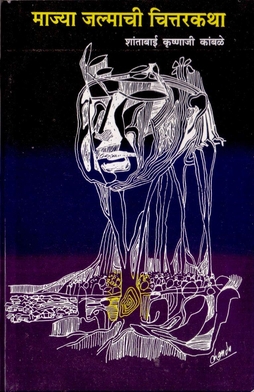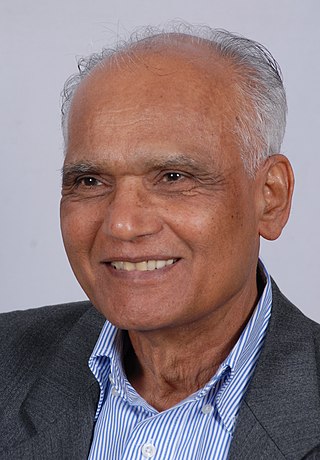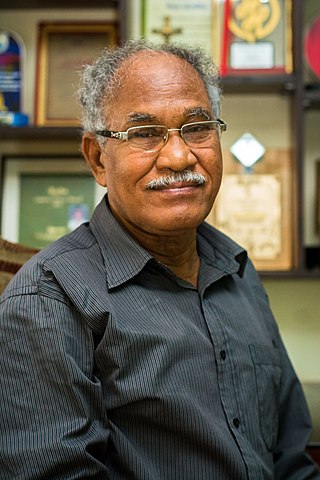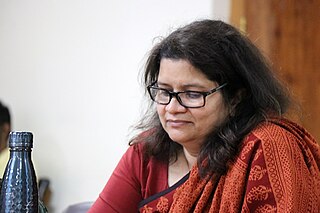
Marathi is an Indo-Aryan language predominantly spoken by Marathi people in the Indian state of Maharashtra. It is the official language of Maharashtra, and an additional official language in the state of Goa used to reply provided the request is received in Marathi. It is one of the 22 scheduled languages of India, with 83 million speakers as of 2011. Marathi ranks 13th in the list of languages with most native speakers in the world. Marathi has the third largest number of native speakers in India, after Hindi and Bengali. The language has some of the oldest literature of all modern Indian languages. The major dialects of Marathi are Standard Marathi and the Varhadi dialect.
Marathi literature is the body of literature of Marathi, an Indo-Aryan language spoken mainly in the Indian state of Maharashtra and written in the Devanagari and Modi script.
Mahesh Elkunchwar is an Indian playwright and screenplay writer in Marathi language with more than 20 plays to his name, in addition to his theoretical writings, critical works, and his active work in India's Parallel Cinema as actor and screenwriter. Today along with Vijay Tendulkar, he is credited as one of the most influential and progressive playwrights not just in Marathi theatre, but also in Indian theatre. In 2014, he was awarded the Sangeet Natak Akademi Fellowship, the highest honour in performing arts in India.
Govind Vinayak Karandikar, better known as Vindā, was an Indian poet, writer, literary critic, and translator in the Marathi-language.

Mannu Bhandari was an Indian author, screenplay writer, teacher, and playwright. Primarily known for her two Hindi novels, Aap Ka Bunty and Mahabhoj (Feast), Bhandari also wrote over 150 short stories, several other novels, screenplays for television and film, and adaptations for theater. She was a pioneer of the Nayi Kahani movement in Hindi literature, which focused on the aspirations of the emerging Indian middle class, and her own work is notable for its depiction of the inner lives of middle class working and educated women. Her work tackles themes of family, relationships, gender equality, and caste discrimination in India.

Govind Mishra is an Indian novelist, who has written more than 53 books. He was also a civil servant with Indian Revenue Service (IRS) and retired as Chairperson, Central Board of Direct Taxes in 1997. Over the years, he has written 11 novels, 14 short story collections, five travelogues, five literary essays collection, a poem collection and 2 story books for children.
The Saraswati Samman is an annual award for outstanding prose or poetry literary works in any of the 22 languages of India listed in Schedule VIII of the Constitution of India. It is named after the Hindu goddess of knowledge, Saraswati.
Lakshman Shastri Joshi was an Indian scholar, of Sanskrit, Hindu Dharma, and a Marathi literary critic, and supporter of Indian independence. Mahatma Gandhi chose him to be his principal advisor in his campaign against untouchability. Joshi was the first recipient of Sahitya Akademi Award in year 1955. He was also awarded with two of the India's highest civilian honours Padma Bhushan in 1973 and Padma Vibhushan in 1992

Arun Krushnaji Kamble was an Indian Marathi language writer, professor, Politician, and Dalit activist. Arun Kamble, President and one of the founding members of Dalit Panthers of India, worked as a Head of Marathi department at University of Mumbai. He was the National General Secretary of Janata Dal. He took many major decisions in favour of Dalit, Backward Class and Minorities.

Majya Jalmachi Chittarkatha is an autobiography of Shantabai Kamble published in 1983. This is considered the first autobiographical narrative by a Dalit woman writer. The work has been translated into various languages and is required reading for Marathi literary students at the University of Mumbai.
Keshav Tanaji Meshram was a Marathi poet, critic, novelist, and short-story writer from Maharashtra, India. He wrote about 40 books.
Dalit literature is a genre of Indian writing that focuses on the lives, experiences, and struggles of the Dalit community, who have faced caste-based oppression and discrimination for centuries. This literature encompasses various Indian languages such as Marathi, Bangla, Hindi, Kannada, Punjabi, Sindhi, Odia and Tamil and includes diverse narratives like poems, short stories, and autobiographies. The movement originated in response to the caste-based social injustices in mid-twentieth-century independent India and has since spread across various Indian languages, critiquing caste practices and experimenting with different literary forms.

Santeshivara Lingannaiah Bhyrappa is an Indian novelist, philosopher and screenwriter who writes in Kannada. His work is popular in the state of Karnataka and he is widely regarded as one of modern India's popular novelists. His novels are unique in terms of theme, structure, and characterization. He has been among the top-selling authors in the Kannada language and his books have been translated into Hindi and Marathi which have also been bestsellers.

Urmila Pawar is an Indian writer and activist in the dalit and feminist movements in India and her works, all of which are written in Marathi language, have often been hailed as a critique of social discrimination and the savarna exploitation by commentators and media outlets.
Upara is an autobiography written by Laxman Mane, a writer who lives in the state of Maharashtra, India. It is written in the Marathi language. It was first published in 1980. It has been translated into English by A. K. Kamat and titled "Upara - An Outsider". Arjun Dangle sees it as a remarkable example of a "Dalit" autobiography. It finds mention in Encyclopaedia of Indian Literature under the genre Autobiography (Marathi). It has won the Sahitya Academy Award for the year 1981. According to Braj B. Kachru et al. it is a path breaking work in the domain of Marathi literature. The Cambridge Companion to Modern Indian Culture (2012) considers it to be a "landmark publication".

Sitanshu Yashaschandra Mehta, better known as Sitanshu Yashaschandra, is a Gujarati language poet, playwright, translator and academic from India.

Mahabaleshwar Sail is an Indian author. He has been honoured with the Saraswati Samman, 2016 for his novel 'Hawthan' (हावटण).

Aparna Lanjewar Bose is an Indian trilingual writer, poet, critic, and translator. She is currently working in The English and Foreign Languages University, Hyderabad as an Associate Professor, at the School of Literary Studies. She is an author of several books and articles in Marathi and English.
A. A. Manavalan (1937–2018) was a Tamil language Indian scholar. He was awarded Saraswati Samman (2011) for his work Irama Kathaiyum Iramayakalyum (2005), which is a comparative study of Ramayana written in 48 languages including Sanskrit, Pali, Prakrit, Tibetan, Tamil, Old Javanese, Japanese, Telugu, Assamese, Malayalam, Bengali, Kannada, Marathi, Hindi, Odisi, Persian, Malay, Burmese, Maranao, Thai, Laotian and Kashmiri. He was the second person from Tamil Nadu to receive this honour, first was Indira Parthasarathy

Sheoraj Singh Bechain is an Indian poet, short story writer, and essayist. When he started writing and progressing academically, he adopted the pen name "Bechain". He was appointed Professor on an unreserved position in the Department of Hindi at the University of Delhi in 2010 and became the first Dalit Professor in the department. He is currently serving as the Head of the Hindi Department at the University.










